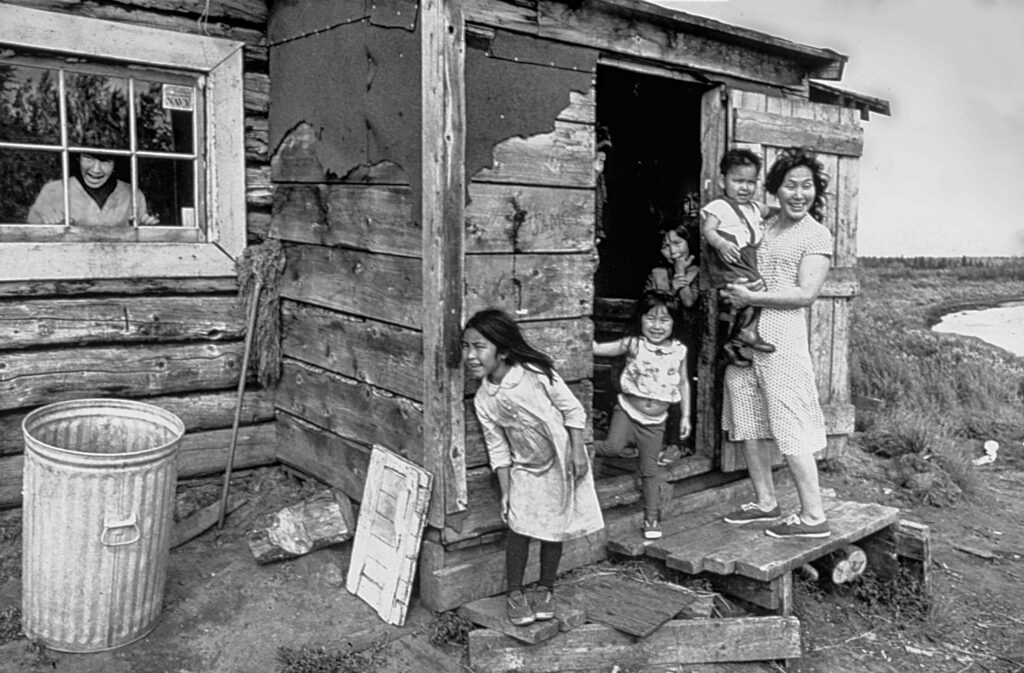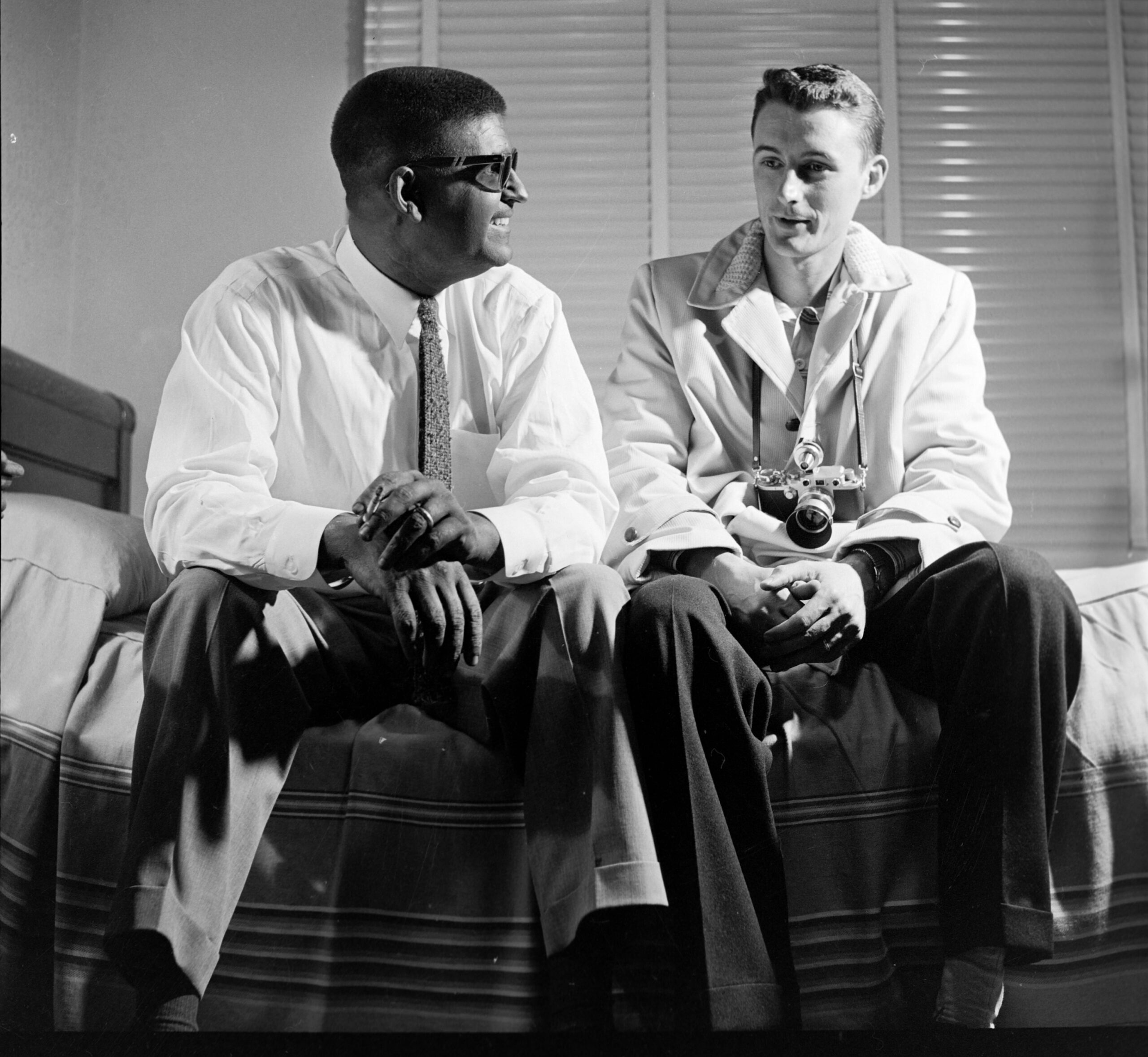Photo of Don Rutledge with John Howard Griffin as they worked on the book Black Like Me.
Don Rutledge has worked in 143 countries and all 50 states. His work has included assignments from the world famous Black Star picture agency in New York; to civil rights efforts (including documenting the work of John Howard Griffin for Black Like Me); to photo stories in Associated Press, Life, Look, Time, Newsweek, Forbes, Stern in Germany, and Paris-Match in France; and numerous publications in Canada, South America, Europe, and Asia.
It all started in 1955; Don frequently wrote Howard Chapnick, the Black Star Photo Agency president. Don had observed the bylines of the photographers in magazines and saw that Black Star represented many of the photographers. Black Star told Don they wanted to know a portfolio before giving him an assignment. Don didn’t have a portfolio. So when Don was corresponding, he gave them story idea after story idea.
Black Star was frustrated with the person who kept writing them so often. He had some excellent ideas, but can he take a photograph? They wrote back, letting him know they liked one of his ideas. They contacted the parties to see if they were interested. That first story was for Friends magazine. This publication was the magazine of the Chevrolet Company.
Don was so delighted with the response he immediately contacted the people, shot the story, wrote the material, and sent the package of contact sheets and material to Black Star. Black Star was quite upset. “We haven’t even talked to them, and you have already shot the story,” was the reply Don received. They also informed him of the many holes in the story and how it would not work. Telling Don was their mistake.
Don contacted the people again and went backfilling in the holes. The feedback was Don’s first time having someone critique his work and guide him. The Friends Magazine not only liked the work but wanted to use Don again.
The Friends Magazine was the beginning of a close relationship of Don with Black Star and even more with Howard Chapnick. Howard Chapnick is considered the “Dean of Photojournalism” and is highly regarded worldwide in the photography business. “His strength over the years was his high sense of ethics and his religiosity if you will,” commented Chapnick. “This carried through into his concern for humanity and the important issues. He tried to use photography to make people aware of the great problems in the world. He used it as a force for change, changing public perceptions and alerting the world to the problems that the world suffers like poverty and sickness.”
“One of his great strengths is that he was very observant of the world around him, not only in the big stories but the little ones. He had this happy faculty of being responsive to visually translatable ideas into commercial entities.”
Rutledge says, “Photography… forces us to see, to look beyond what the average person observes, to search where some people never think to look. It even draws us back to the curiosity we experienced in our childhood.

“Children are excited about their surrounding world: Why is the sky blue? Why are one flower red and another yellow? How do the stars stay up in the sky? Why is the snow cold?
“As the years go by, that curious child matures into a normal adult with the attitude of ‘who cares anymore about those childish questions and answers?’ The ‘seeing beyond what the average person sees’ fills us constantly with excitement and allows us to keep the dreams of our youth.”
Dan Beatty, the photo quality coordinator at the Richmond Times-Dispatch, worked with Don Rutledge on The Commission magazine, where together they won numerous awards for the magazine.
“Don is the one person who has completely influenced the magazine’s direction. Before Don came, we knew that there was a certain way we wanted to present the mission material in the magazine. None of us had a firm grasp on what direction we should go to achieve our goals. Don provided the direction for us to go. Don never express strong feelings about—in a critique type—on the magazine. Just Don’s presence and constant example of someone who always strives for the best is what guided us along. He constantly connected us with different individuals in the field of photojournalism and layout and design. He felt these would be good influences on the magazine or influences that would help us along the road where we wanted to be with the publication.”
Beatty says, “I would not be doing what I am doing, at the level I am doing it, if it hadn’t been for Don. He is an example of consistency and integrity in a field where that is not always a constant with the different people I’ve met. He represented something that I wanted to achieve myself. He has been the biggest influence I can think of on me personally and the different photographers I have worked with along with Don.”
Joanna Pinneo, based in Longmont, Colorado, is one of the nation’s top magazine photographers. She has won third place in the Magazine Photographer of the Year competition and has been nominated for a Pulitzer Prize. Her career started in the lab for The Commission and today continues to shoot assignments for National Geographic Magazine.
Pinneo says, “Don spent hours with me, reviewing my contact sheets and helping me see which pictures were successful and tips to improve.”
“He worked with me on depth and layers and meanings. What to include and what not to include. He showed me how a millimeter can distinguish between a good and a great photograph.” “It was just the kind of nurturing a young photographer needs to help figure out what’s important visually and emotionally when taking pictures.”
The foreword by Tom Kennedy, former director of Photography for the National Geographic Society and now managing editor for multimedia, Washingtonpost.com Interactive, states in his introduction to the book that “Don’s photos sparkled with examples of human joy, tragedy, and daily life in between. . . . Don’s photos convey the power of God’s handiwork and His presence in our world. . . . I’m proud to have had him as a mentor on my life’s journey.”
Don is retired and lives in Midlothian, VA.
SIGNIFICANT PREPUBLICATION DISCOUNTS
The selling price for this book, effective March 15, will be $29.95. You can order copies at the following prepublication discounts between today and March 14:
- 1-10 copies: $26.95 each (10 percent discount)
- 11-25 copies: $25.45 each (15 percent discount)
- 26 or more copies: $23.96 each (20 percent discount)
TO ORDER COPIES
Provide your name, shipping address (for multiple copies, please provide a physical UPS shipping address), and telephone number. We will include an invoice when we ship your copy (or copies). Shipping charges will be added. NOTE: The Baptist History and Heritage Society is the sole distributor of this book.
Charles W. Deweese
Executive Director-Treasurer
Baptist History and Heritage Society
P.O. Box 728
Brentwood, TN 37024-0728
615-371-7938
cdeweese@TNBaptist.org

